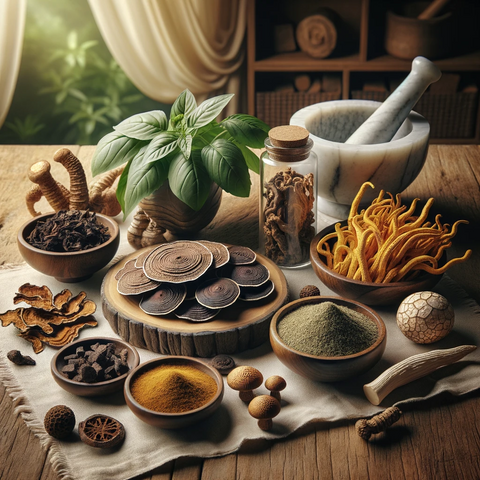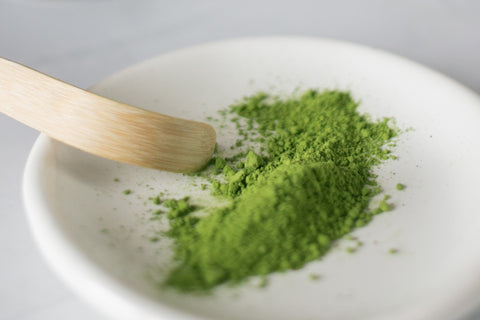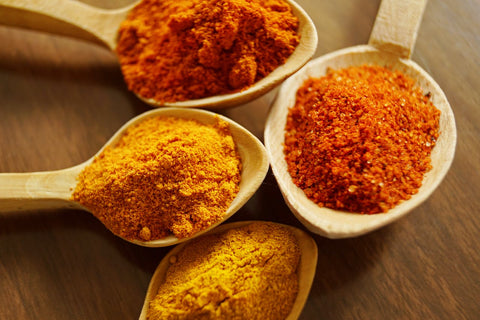Introduction to Adaptogens
In recent years, the health and wellness community has seen a resurgence of ancient wisdom, blending seamlessly with modern science to give rise to trends that cater to holistic health. Among these trends, the term 'adaptogens' has buzzed its way to the forefront. As health enthusiasts dive deeper into understanding how our bodies can naturally combat stress, the allure of adaptogens has grown exponentially. From the revered Ashwagandha to the mystical Reishi mushroom, adaptogens are hailed as nature's answer to modern-day stressors. Amidst this adaptogenic wave, there's one star that's been brewing its way into our hearts (and cups) - Matcha. A finely ground powder made from green tea leaves, matcha is more than just a ceremonial drink from Japan; it's a potent source of nutrients and antioxidants. But is matcha an adaptogen? And how does it measure up against other foods rich in adaptogenic properties? Let’s uncover the mysteries of matcha and its place in the adaptogenic realm.

Defining Adaptogens
Adaptogens, a term rooted in both history and science, pertain to a unique class of plants and fungi that assist the body in managing and adapting to stress. Historically, adaptogenic herbs and roots have been the cornerstone of ancient medicinal practices. From the age-old Chinese traditions to the Ayurvedic systems of India, these natural wonders have been utilized for their restorative and balancing properties for centuries.
The defining characteristic of an adaptogen is its ability to restore the body to its optimal physiological function, especially when faced with stressors. These stressors can be varied, from emotional and mental challenges like work pressures and emotional upheavals to physical strains like illnesses or fatigue. Adaptogens act much like a thermostat, sensing when the body's responses are too heightened or too subdued and working to recalibrate these reactions to a state of equilibrium.
Over the years, as the West became more acquainted with these ancient practices, a renewed interest in adaptogens emerged. Studies began to validate what traditional healers had known all along: that adaptogens, when used correctly, have the potential to offer a plethora of health benefits without causing harm. They are non-toxic and aim to enhance the body's ability to combat stress and fatigue, targeting the body's three stages of stress: Alarm, resistance, and exhaustion.(1)
Yet, amidst the vast array of adaptogenic herbs, roots, and fungi, where does matcha stand? To answer this, we must first delve deeper into the green, frothy world of matcha.

Unveiling Matcha: The Green Elixir of Japan
Matcha, a staple in Japanese culture, is a fine powder made from specially grown and processed green tea leaves. Unlike regular green tea where the leaves are steeped and discarded, matcha involves consuming the entire leaf, ensuring that all its nutritional benefits are imbibed. This ceremonial tea has been an integral part of Japanese tradition for centuries, not just for its unique flavor but also for its numerous health benefits.
So, is matcha an adaptogen? The answer lies in its composition. Matcha is rich in a specific amino acid called L-theanine. L-theanine is known for its calming properties, particularly its ability to induce relaxation without drowsiness. This makes matcha a perfect candidate to help the body adapt to stress, offering a calm alertness that contrasts sharply with the jitters often associated with caffeine. (2)
But that's not all. Matcha is also packed with powerful antioxidants, including a special class of polyphenols known as catechins. Among these, epigallocatechin gallate (EGCG) stands out for its significant health benefits. Research suggests that EGCG can help fight inflammation, promote cognitive function, and even support heart health. These antioxidants work in tandem to combat oxidative stress, a significant contributor to inflammation and various chronic diseases.(3)
Furthermore, matcha's adaptogenic credentials are also reflected in its ability to support a healthy glucose response, balancing the body's insulin levels and offering protection against potential spikes and crashes in energy. This balance is vital for the body's ability to adapt to different situations and stressors, ensuring steady energy levels throughout the day. (4)
Matcha's adaptability extends to its role as an energizer. Unlike other caffeinated beverages that may cause a sudden surge in energy followed by an inevitable crash, matcha provides a sustained release of energy. This is largely attributed to the combination of caffeine and L-theanine, ensuring that while you're energized, you remain grounded. (5)

Beyond Matcha: A World of Adaptogenic Foods
While matcha holds its revered place in the adaptogenic realm, it's just one player in a vast field of foods known for their stress-combating properties. These foods, many deeply rooted in ancient medicinal practices, offer a natural way to enhance our body's resilience against various stressors.
- Turmeric: This golden-hued spice, a staple in Indian cuisine, is renowned for its anti-inflammatory properties. Curcumin, the active ingredient in turmeric, has been studied extensively for its potential health benefits, ranging from reducing inflammation to boosting cognitive functions.(6)
- Ashwagandha: Often referred to as 'Indian Ginseng,' Ashwagandha is a potent herb used in Ayurvedic medicine. It's known for its rejuvenating properties, assisting in reducing anxiety, improving sleep, and even enhancing muscle growth and strength.(7)
- Reishi Mushroom: Dubbed the 'Mushroom of Immortality' in Chinese tradition, reishi mushrooms are recognized for their immune-boosting properties. They also aid in reducing stress and promoting a calm state of mind. (8)
- Holy Basil (Tulsi): Not to be confused with the common culinary basil, holy basil or tulsi is often regarded as a tonic for the body, mind, and spirit. It's known to reduce stress, balance hormones, and promote mental clarity. (9)
- Maca Root: Originating from the Andes mountains, maca root is often dubbed a 'superfood.' It's known to boost energy, improve mood, and even enhance sexual health. (10)
- Rhodiola Rosea: This Arctic herb is revered for its ability to help the body adapt to physical and emotional stress, boosting energy, endurance, and mental clarity. (11)
These adaptogenic foods, much like matcha, offer a holistic approach to health. They don't just target one symptom or ailment but work in harmony with the body, aiding its natural processes and promoting overall well-being.
Integrating Adaptogens into Your Diet
Embracing adaptogens is not about a complete dietary overhaul but integrating these potent foods into your daily routine. Here are some ways to do so:
Morning Ritual: Swap your regular coffee with a matcha latte or add a teaspoon of ashwagandha or maca powder to your morning smoothie.
Spice It Up: Incorporate turmeric into your meals. A turmeric-infused tea or 'golden milk' can also be a soothing evening drink.
Herbal Teas: Explore teas made from tulsi or reishi mushrooms. They can be a calming addition to your evening routine, preparing you for a restful night.
Supplements: If integrating these foods into meals proves challenging, consider adaptogenic supplements available in capsule or powder form.
In essence, adaptogens like matcha and the others mentioned offer a pathway to balance, resilience, and holistic well-being. As modern life becomes increasingly hectic, turning to these time-tested remedies can be our secret weapon for sustained health and vitality.

The Science Behind Adaptogen
While traditional cultures have sworn by the effectiveness of adaptogens for centuries, modern science is now catching up. Numerous studies are being conducted to explore the tangible benefits of adaptogens on human health.
Clinical Evidence: Several clinical trials, especially those indexed in databases like the NIH (National Library of Medicine), have begun to validate the health claims associated with adaptogens. For instance, ashwagandha has shown promise in combating stress and anxiety in randomized controlled trials. (12)
Mechanism of Action: The way adaptogens work is fascinating. They interact with the hypothalamic-pituitary-adrenal (HPA) axis and the sympathoadrenal system, both crucial in the body's stress response. By modulating these systems, adaptogens can help the body maintain equilibrium, even in challenging situations. (13)
Safety Profile: Another advantage of adaptogens is their generally favorable safety profile. While they are potent, they are also typically gentle on the body, especially when compared to pharmaceutical drugs. However, as with any supplement or change in diet, it's crucial to consult with a healthcare professional before incorporating high amounts of adaptogens. (14)
Precautions and Considerations with Adaptogenics
While adaptogens are generally considered safe, it's essential to approach them with a certain level of caution:
Quality Matters: Always opt for high-quality, organic adaptogen sources. Given the rising popularity of these herbs and foods, the market is flooded with products. Not all of them adhere to quality and purity standards.
Potential Interactions: Some adaptogens might interact with medications or medical conditions. For instance, turmeric can thin the blood and might not be suitable for individuals on blood-thinning medications. (15)
Listen to Your Body: Everyone's body is different. While many might benefit from the inclusion of adaptogens, some might experience side effects. It's crucial to start slow, monitor how you feel, and adjust accordingly.
The Adaptogenic Path to Holistic Health
In the quest for optimal health, adaptogens emerge as powerful allies. From the calming and energizing effects of matcha to the mood-enhancing properties of maca root, these natural substances hold the key to balanced well-being. By understanding their benefits and integrating them wisely into our diets, we pave the way for a life of vitality, resilience, and holistic health.
References
- Panossian, A., & Wikman, G. (2010). Effects of adaptogens on the central nervous system and the molecular mechanisms associated with their stress-protective activity. Pharmaceuticals, 3(1), 188-224.
- Juneja, L. R., Chu, D. C., Okubo, T., Nagato, Y., & Yokogoshi, H. (1999). L-theanine—a unique amino acid of green tea and its relaxation effect in humans. Trends in Food Science & Technology, 10(6-7), 199-204.
- Chow, H. H. S., Cai, Y., Hakim, I. A., Crowell, J. A., Shahi, F., Brooks, C. A., ... & Alberts, D. S. (2003). Pharmacokinetics and safety of green tea polyphenols after multiple-dose administration of epigallocatechin gallate and polyphenon E in healthy individuals. Clinical Cancer Research, 9(9), 3312-3319.
- Horie, H., et al. (2018). Effects of Dietary Green Tea Polyphenols on the Regulation of Blood Glucose Level. Biomedical Research on Trace Elements, 29(2), 65-70.
- Dietz, C., & Dekker, M. (2017). Effect of Green Tea Phytochemicals on Mood and Cognition. Current Pharmaceutical Design, 23(19), 2876-2905. This study touches on how the combination of caffeine and L-theanine in green tea can have a unique effect on mood and cognition, which can relate to the claim of sustained energy and groundedness.
- Aggarwal, B. B., & Harikumar, K. B. (2009). Potential therapeutic effects of curcumin, the anti-inflammatory agent, against neurodegenerative, cardiovascular, pulmonary, metabolic, autoimmune and neoplastic diseases. The international journal of biochemistry & cell biology, 41(1), 40-59.
- Chandrasekhar, K., Kapoor, J., & Anishetty, S. (2012). A prospective, randomized double-blind, placebo-controlled study of safety and efficacy of a high-concentration full-spectrum extract of ashwagandha root in reducing stress and anxiety in adults. Indian journal of psychological medicine, 34(3), 255.
- Wachtel-Galor, S., Yuen, J., Buswell, J. A., & Benzie, I. F. F. (2011). Ganoderma lucidum (Lingzhi or Reishi): A Medicinal Mushroom. In Herbal Medicine: Biomolecular and Clinical Aspects (pp. 175-182). CRC Press/Taylor & Francis.
- Cohen, M. M. (2014). Tulsi - Ocimum sanctum: A herb for all reasons. Journal of Ayurveda and integrative medicine, 5(4), 251.
- Gonzales, G. F. (2012). Ethnobiology and ethnopharmacology of Lepidium meyenii (Maca), a plant from the Peruvian highlands. Evidence-Based Complementary and Alternative Medicine, 2012.
- Panossian, A., Wikman, G., & Sarris, J. (2010). Rosenroot (Rhodiola rosea): traditional use, chemical composition, pharmacology and clinical efficacy. Phytomedicine, 17(7), 481-493.
- Chandrasekhar, K., Kapoor, J., & Anishetty, S. (2012). A prospective, randomized double-blind, placebo-controlled study of safety and efficacy of a high-concentration full-spectrum extract of ashwagandha root in reducing stress and anxiety in adults. Indian journal of psychological medicine, 34(3), 255.
- Panossian, A., & Wikman, G. (2010). Effects of adaptogens on the central nervous system and the molecular mechanisms associated with their stress-protective activity. Pharmaceuticals, 3(1), 188-224.
- Panossian, A., & Wikman, G. (2010). Effects of adaptogens on the central nervous system and the molecular mechanisms associated with their stress-protective activity. Pharmaceuticals, 3(1), 188-224.
- Jurenka, J. S. (2009). Anti-inflammatory properties of curcumin, a major constituent of Curcuma longa: a review of preclinical and clinical research. Alternative medicine review, 14(2).

